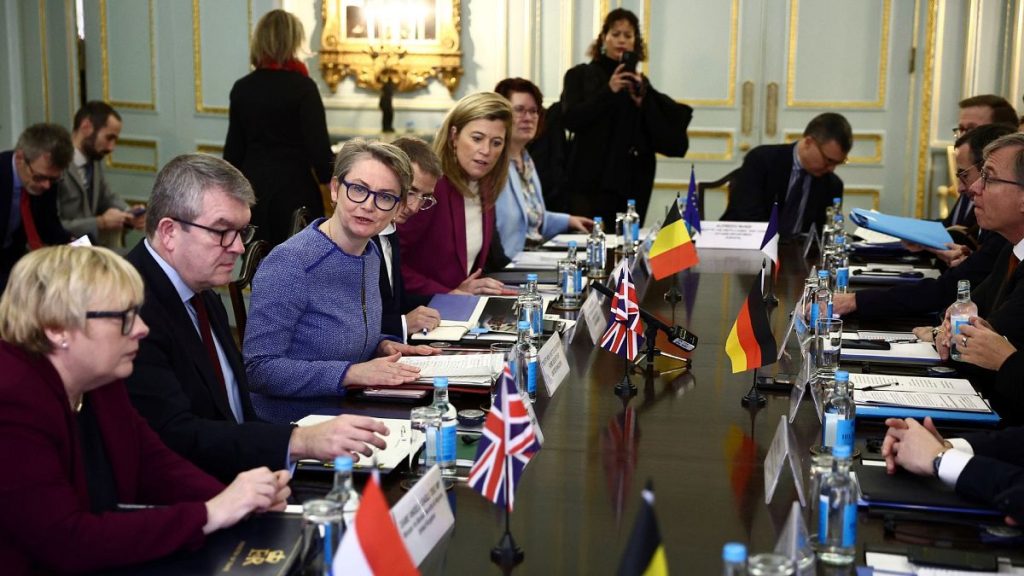The UK and Germany have forged a significant bilateral agreement aimed at dismantling the criminal networks orchestrating the perilous small boat crossings of the English Channel by migrants. This joint action plan, signed by UK Home Secretary Yvette Cooper and German Interior Minister Nancy Faeser, signifies a crucial step in bolstering cross-border cooperation and intelligence sharing to combat this escalating humanitarian and security challenge. The agreement specifically targets the financial flows that fuel these smuggling operations, and includes a commitment to remove online content promoting illegal migration, acknowledging the role of social media platforms in facilitating these dangerous journeys. Germany, a key transit point where many of the boats used in these crossings are stored, has committed to criminalizing the facilitation of migrant smuggling to the UK, underscoring the seriousness with which both nations are approaching this issue.
This collaboration between the UK and Germany recognizes that the criminal networks orchestrating these crossings operate across borders, necessitating a coordinated international response. Both Cooper and Faeser emphasized the importance of enhanced information exchange between security authorities and sustained investigative pressure to identify and disrupt the financial infrastructure supporting these criminal enterprises. By targeting the financial flows, the agreement seeks to undermine the profitability of these operations, ultimately deterring future smuggling activities. The commitment to remove online content promoting illegal migration recognizes the insidious role of social media in normalizing and facilitating these dangerous journeys, often presenting a distorted picture of the risks involved.
The signing of this agreement precedes a broader meeting of the “Calais Group,” a collaborative initiative involving the UK, Germany, Belgium, France, and the Netherlands, alongside Europol and Frontex, the EU’s border and coast guard agency. This group represents a concerted effort to address the complex challenges of irregular migration in the Channel region through enhanced cooperation and information sharing. The agreement between the UK and Germany serves as a crucial building block for this broader collaborative framework, demonstrating a commitment to joint action and shared responsibility in tackling this multifaceted issue. The inclusion of Europol and Frontex highlights the importance of leveraging the expertise and resources of these European agencies in supporting national efforts.
The collaboration with Germany is particularly significant for the UK in the context of its post-Brexit relationship with the EU. Brexit has created challenges for international law enforcement cooperation, with the UK no longer participating in Europol and the EU’s intelligence-sharing framework. This agreement represents a positive step towards rebuilding and strengthening these vital security partnerships, demonstrating that effective cooperation on critical issues like cross-border crime can continue despite the changed political landscape. It signifies a recognition on both sides of the Channel that shared security threats require collaborative solutions, regardless of broader political considerations.
The English Channel remains a perilous route for migrants, many of whom are fleeing conflict, persecution, or poverty in their home countries. Factors such as language proficiency, existing family ties, and perceived better opportunities for asylum and employment contribute to the UK’s attractiveness as a destination. However, the perilous journey across the Channel in often overcrowded and unseaworthy boats carries significant risks. This year has witnessed a tragic surge in fatalities, with over 70 lives lost, making it the deadliest year since the surge in crossings began in 2018. The increasing number of crossings, exceeding 31,000 this year, underscores the urgency of addressing this issue and the importance of collaborative efforts like the UK-Germany agreement.
The joint action plan between the UK and Germany represents a significant commitment to tackling the complex issue of migrant smuggling across the English Channel. By focusing on intelligence sharing, disrupting financial flows, and combating online misinformation, this agreement aims to dismantle the criminal networks profiting from human misery. This collaboration is not only crucial for enhancing border security but also for safeguarding the lives of vulnerable individuals seeking refuge or opportunity. It serves as a model for international cooperation in addressing shared challenges and demonstrates the importance of building robust partnerships to combat transnational crime and protect human lives. The success of this agreement will depend on continued commitment and effective implementation by both nations, working in concert with their European partners.














